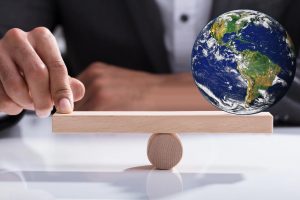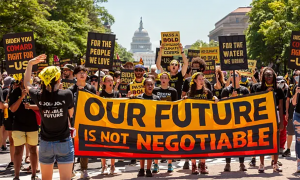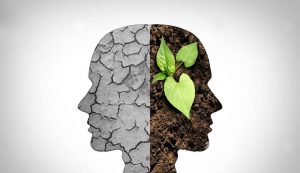Gustavo Dessal’s essay “Our Blind Spot” was a wake-up call that was featured on the Lacanian Review Online November 26, 2021 #320. He addressed Climate Matters as a “blind spot” among psychoanalysts. He identified that there was insufficient discourse regarding the developing Climate Crisis. This issue has been highlighted by demonstrations, particularly by young people. It has been illuminated by the media, feature films, documentary films, literature, and science fiction. Climate Matters are of great concern.
If you are a reader with limited time and a desire for pragmatic tools to deal with urgent Climate Matters, please click here
TIPPING POINTS

Dessal gave voice to Jacques Lacan’s foresight in Lacan’s Milan, Italy Lecture of 1974. That’s almost a half century ago. Today we are faced with an urgency from the effects of Climate Change with the increase of our carbon footprint and the increased levels of Greenhouse gasses on the earth. This is now of significant concern. Dessal soberly urged everyone to open their eyes. We need to take responsibility for the effects of our lifestyles on global climate.
By referring to the tipping point, a notion that originated in science, we could be arriving at a tipping point of frightening climate hazards. My investigation of “tipping points” led to the “butterfly effect,” that describes how the “power” of the delicate fluttering butterfly’s wings in one geographic location could create significant effects in distant locations. Of importance is that the effects of small actions need not be negative, as Malcolm Gladwell describes in his book THE TIPPING POINT. However, the tipping point is frequently thought to be a point beyond repair. Recently we have seen a weather pattern of tornadoes devastating parts of Arkansas, Illinois, Kentucky, Mississippi, Missouri, Texas, Louisiana, and Tennessee. Could this have been triggered by butterflies?

Mathematicians and meteorologists invite us to consider Chaos Theory. This theory includes notable attention to observations of diverse weather patterns. Meteorology is the branch of the atmospheric sciences which studies the impact of atmospheric chemistry and atmospheric physics occurring all over the globe.
Consider these recent climate conditions. Madagascar is located in the Indian Ocean off the coast of southern Africa. This country experienced flooding, droughts, cyclones, rains, and crop destruction. Many Madagascans have suffered from food deprivation. In the US this past winter there was devastation in Colorado caused by wild fires that were spread by windstorms of up to 110 mph. This was preceded by record heat and minimal snowfall. Many thousands of people had to evacuate their homes. Many homes were destroyed.
The current conflicts and controversies about deforestation could expose enormous areas like the Amazon in Brazil and the peat fields in the Congo to the release of formerly sequestered carbon gasses, currently contained by the roots of trees. If this deforestation goes forward the resulting conditions will definitely contribute to tipping points that will more than likely exceed any potential corrections implemented by scientists. When we consider this reality, we must mobilize an effort to save the earth, ourselves, our descendants, along with the birds, insects, trees, fish, forests, oceans, and glaciers, as well as all other living matter.
With the onset of the Industrial Revolution in the mid —18th century came “progress” from the creativity of human intelligence and the anticipation of financial rewards. Capitalism evolved from advancements in science and technology. Some of this progress and its consequences might have been better if evolved from nature, rather than created by humans who may not have sufficiently considered the consequences of what progress would bring. In the 20th century the world experienced this with the creation of atomic bombs, the destruction of Hiroshima and Nagasaki, and the effects of radiation. Scientists have since learned to be very cautious.
This applies to developments in geo-engineering. This is also referred to as “climate intervention” to cope with the Climate Crisis. Geo-engineering is promising, but great caution must be exercised by scientists. Efforts to block solar radiation by injecting aerosols into the atmosphere to reflect the sun’s energy back into space and limit its entry into the earth’s atmosphere could have widespread devastating effects on different parts of the earth. The Harvard Experiment SCoPEx (Stratospheric Controlled Perturbation Experiment) has addressed ethical concerns which have served as an emergency brake on potentially risky projects. The pace for climate intervention has been slowed somewhat. Scientists are proceeding with caution to avoid creating potential harm to people and the earth. The Harvard Solar Geo Engineering Project is one project in question around which there has been respectable caution.
THE POWER OF HUMAN SPIRIT AND ENERGY FROM GENERATION Z
Generation Z includes Time Magazine’s Person of the Year 2019 Greta Thunberg of Sweden who has 17 million followers. Two Americans also of Gen Z are Caulin Donaldson with 1.4 million followers and Alaina Wood with 300,000 followers. These young people are encouraging all of us to care about our neighbors, not only those in towns and villages adjacent to our own, but also in towns and villages across the globe.

Generation Z is demonstrating and speaking out about “Dooms Day” talk — that the end is near. They are also speaking out against “Hopeium.” “Hopeium” is thinking that we should leave the tasks of caring for the climate to technology and magic and to others with wealth and greater influence. Clearly “Hopeium” is counter to Gen Z’s urging all of us to proactively exercise our personal efforts to create solutions to the world’s Climate Change issues. These Climate troubles are shared all over the world and the enlightened people of the world must eliminate the “blind spot!”
Malcom Gladwell details in his book THE TIPPING POINT how spirited, energetic young people can reverse a trend and achieve a self-fulfilling prophesy of beneficial aspirations and desires. Gen Z members are similar to the kind of people about whom Gladwell wrote. They taught us how to successfully start a trend and generate an extensive ripple effect by drawing in others to behave similarly.
Perhaps the threats from the Climate Crisis can be spun around by the spirit and energy of Gen Z, especially if they can enlist millennials and baby boomers and generate a ripple effect. Those Gen Z millions who do demonstrate and express their perspectives could generate a “butterfly effect“ with beneficial results in Climate Change trends.
THE NEED FOR DISCOURSE
The local newspaper in my home town features a column: EARTH MATTERS. The featured article on Friday (2/25/2022) was “Don’t Stop Talking about Climate Change.” The columnist Lynn Capuano urged her readers to join in the discourse and tell their stories about their feelings, thoughts, and actions to address the urgency they feel about the Climate Crisis. Her column appeared during the week following the most recent publication of the UN’s International Governmental Panel on Climate Change (IPCC 2/21/2022.) Since reading Gustavo Dessal’s essay and seeing Adam McKay’s film “Don’t Look Up,” I too have been trying to facilitate discussion to recognize “my blind spot” and encourage others to recognize theirs, as well.
Adam McKay’s film “Don’t Look Up” is an allegory which addresses the Climate Crisis. McKay uses a huge comet crashing into the earth and destroying the planet. The comet is a metaphor for the Climate Crisis. It is remarkable that when the film was streamed on Netflix, viewers clocked in 263 million hours over the first 11 days. It had the third highest number of viewings of a film to date on Netflix. Those who viewed the film may have been better prepared for the critical and frightening report of the United Nations IPCC which was reported to the public not long after the film was released on Netflix. Dessal’s essay concludes with a disconcerting question, as he refers to the “tipping point” and asks, “What will happen if the tipping points that have been surpassed bring us closer to the possibility of the end of all discourse?”
THE ROLE OF PROFESSIONALS IN MENTAL HEALTH SERVICE
As a psychologist and psychoanalyst my response to Dessal’s inquiry into “Our Blind Spot,” my reaction to “Earth Matters,” and my imaginings generated by the impact of Adam McKay’s film have motivated me to learn about the Climate Crisis. I am sharing what I have learned with you. I talk with close friends, associates, colleagues, new acquaintances, and even strangers about their perspectives on the Climate Crisis. My intention is to discover what I do not know, enlighten others with what I have learned, and exchange perspectives about this crisis. It is about “talking” — that about which Lacan was very wise. People want to and need to talk! Those of us receiving new patients for analysis know they have come to talk, uncover, and discover the issues underlying their anxieties and discontent. For many people Climate Crisis is a hidden anxiety related to their survival and their death anxiety— even if it is unconscious, pre-conscious, disconnected, or dissociated.
The urgency Dessal read in Lacan’s Lecture has arrived. Lacan said there is psychoanalysis— a means available to those who want to understand themselves better. The many benefits of improved understanding include greater clarity about one’s thoughts and feelings, expanded choices, and know-how. It may even lead to the discovery of what we do not know that we know! Increased understanding will benefit the challenge, complaint, or problem that is troubling the inquisitive subject. These are the people who come to talk. We must keep the door open and provide the opportunity for discourse. I believe Dessal was calling us out as professionals and challenging our own availability to talk. He may have been questioning our personal resistance to talk ourselves about survival anxiety, climate anxiety, and general states of anxiety about every day personal issues.

I inquire with patients typically about what seem like important subtle and/or explicit statements of their anxieties about the Climate Crisis. These often appear in their associations or in their dreams. Some give clear expression to their survival anxiety, more so than in the past. Since the start of the COVID Pandemic in March of 2020 there have been more than one million deaths in the US which have increased the manifestation of death anxiety for many. Those speaking of their anxiety often want to say more about their feelings and thoughts and do talk generously when I encourage them. I have also discovered those not ready to speak or those who feel they do not have anything they want to say, do not. My response to Dessal’s sober reflection about the possibility of the end of all discourse is that we owe to everyone who comes to speak to keep the opportunity for discourse active and open!
So Dessal has made his point with me and helped me become even more proactive in generating discourse. I am immersed in an independent study of my practice and in my personal life with regard to the Climate Crisis. I am attempting to determine how many people I encounter have become interested in addressing the Climate Crisis. Just recently at a meeting with my colleagues I asked that the Climate Crisis be placed on our meeting’s agenda. When the item had its turn, I introduced some information about the Climate Crisis and encouraged others to speak about their perspectives. I also asked about what they might be doing in behalf of reducing their carbon footprint.
The next day a colleague emailed me: “Hi Ellyn, we have a hybrid car. We buy our electricity from a wind farm. We recycle our trash, use reusable straws, bring our own bags to grocery and general stores, do our laundry in cold water, and more that slips my mind now.” I thanked her for her email. The next day she sent this text: “ I didn’t realize what we were doing until I wrote it down. Ty for asking.” Another colleague, also at the meeting, emailed me. She said: “After our meeting, Ellyn, I thought about the importance of local action to make small inroads in helping our environment. Living in a very environmentally conscious community the town has banned plastic bags that most stores use to bag groceries. It also banned the use of single use water bottles. Everyone goes to the supermarket and carries in bags for their groceries, or pays 5 or 10 cents for the brown bags. I would encourage you to actively promote this practice through local legislative efforts. Our town also set up water stations where people could refill water bottles. A 501c was set up for donations to cover the cost of installation. I can put you in touch with the people who did this.” I have requested the contact information for those who “did this”!!
HERE ARE SOME USEFUL TOOLS TO COMMENCE
There is a resource — an e-book — a free of charge book available on the internet. The link to the full eBook is
https://www.joingoodside.com/guides/more-climate-action. The link to the separate guides in 4 chapters is https://www.joingoodside.com/guides. At the website of Goodside just by clicking on “e-book,” anyone can download any of the 4 chapters that will provide a concise yet thorough education on Climate Change and the Climate Crisis. In Chapter 3 there is information on 26 ways of thinking about potentially user friendly activities. Exercising any of them can lead to satisfaction. It might result in one person individually starting a ripple effect or setting a trend by taking an action or actions that others might notice and follow. The tipping point here could have a beneficial outcome of any size that would be favorable. It would be oppositional to the catastrophic outcome predicted by the Doomers and certainly oppositional to the inaction of the Hopeiums.
Just as an example, some of the 26 suggestions are relatively easy to execute. For example, instead of pressing “hot” when washing clothes, one could press “cold.” If planning a number of errands, one could plan them for one car trip, instead of daily trips and reduce burning more fossil fuel in the car’s combustion engine. For one’s next car, one might choose an all electric motor. Getting accustomed to a new “cool” baseline temperature in summer and a new “warm” baseline temperature in winter could make use of the thermostat in the home and the car to reduce Greenhouse gasses. The list is rich and reader friendly with potentially achievable actions easy to employ. Chapter 3 is full of good ideas. An army of individual trendsetters can make lots of beneficial ripples by subtle flutterings of butterfly wings to make enough vibrations to contribute to the reduction of carbon emissions.
Chapter 4 of the e-book introduces carbon and other greenhouse gas offsets that allow us to support projects designed by others. With investments in offsets one can make monetary contributions to fund projects or join projects by donating time and energy. Those who are shareholders in public corporations must support the corporate goals to become carbon neutral and enhance their environmental concerns. Reviewing Chapter 4 in the e-Book is a form of action too with potentially unexpected beneficial returns.
IN CONCLUSION AND WITH APPRECIATION
I am glad Gustavo Dessal with his eyes open wrote his essay. I am very encouraged that there is an energized Gen Z. I am pleased that there are also many others whose eyes are opening and are now independently or in association speaking out in many places around the world shouting out that Earth Matters Matter! I am grateful to friends, family, colleagues, associates, acquaintances, and those of similar sentiments who are spreading awareness that the Earth and Climate Matter!